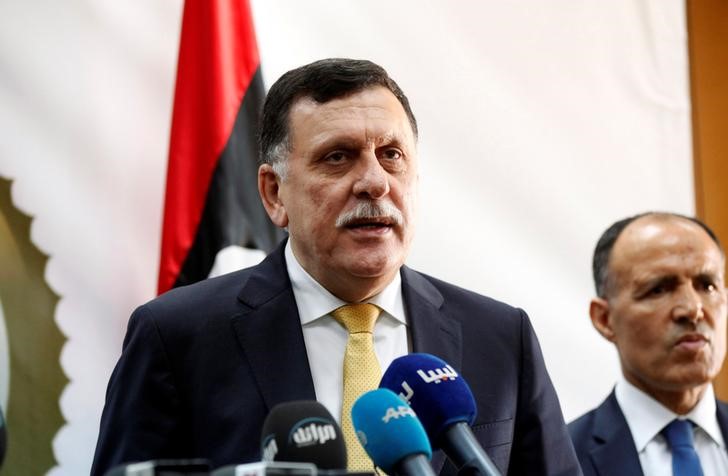By Aidan Lewis
TRIPOLI (Reuters) - Libya is uniting its various armed factions and will be able to eradicate Islamic State militants on its territory with its own forces, the head of the U.N.-backed unity government in Tripoli said on Friday.
Prime Minister Fayez Seraj said his Government of National Accord (GNA) was working with forces from the western city of Misrata and the eastern city of Ajdabiya that were advancing on the radical Islamist movement in their coastal stronghold of Sirte.
No one would be excluded from a national army as long as they submitted to central political authority, he told Reuters in his first interview with international media since arriving in Tripoli in late March.
He also said Libya should retain sovereign control over tackling the crisis of illegal migrants crossing from Libya to Italy in creaking old boats that have frequently sunk, killing many hundreds of people.
"We are sure that the battle and the eradication of Islamic State will be carried out by Libyans," he said.
"I think that what was achieved from Ajdabiya to Sirte and from Misrata to Sirte was a good achievement, given the capabilities that the fighters have."
Seraj's government is the result of a U.N.-mediated deal to stop the anarchy and conflict plaguing Libya since the 2011 uprising that ended Muammar Gaddafi's four decades in power.
Western states see it as the best hope for uniting Libya's many political factions and armed groups to tackle Islamic State and crack down on people-smuggling.
Both crises have been highlighted in the past two weeks, with armed forces loyal to the GNA pushing Islamic State back around their stronghold of Sirte and hundreds of migrants dying in a fresh wave of boat departures from western Libya.
Seraj said destroying smugglers' boats on Libya's shores was "not a solution" and the problem must be dealt with in the migrants' countries of origin.
The GNA is also striving to revive Libya's oil production and rescue its faltering economy.
Seraj said the new government was working to amalgamate rival offices of Libya's key institutions, but no decision has yet been taken about the future leadership of the central bank, National Oil Corporation, or sovereign wealth fund.
